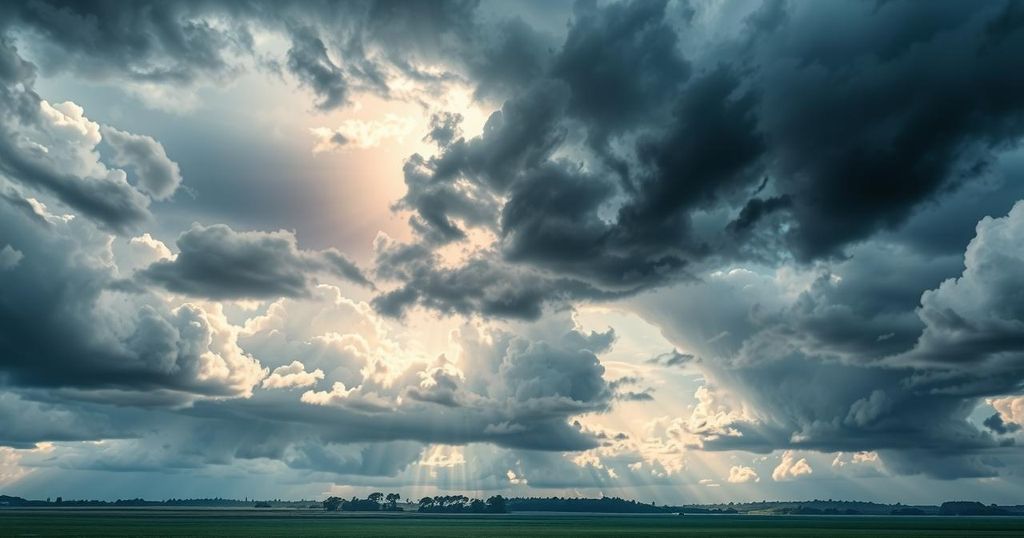The article highlights how intense weather events in 2025, such as wildfires and severe storms, are linked to climate change. Recent advances in science have enabled a better understanding of the connection between human-induced climate change and weather phenomena. While not all weather fluctuations can be attributed to climate change, its impact on the frequency and severity of extreme weather events is becoming increasingly evident. Climate change continues to reshape weather patterns worldwide.
The year 2025 commenced with remarkable and severe weather phenomena, including 100-mph winds in Southern California that contributed to unprecedented wildfires. Concurrently, the Mid-Atlantic and southern regions experienced heavy winter storms. As this extreme weather unfolded, scientific reports highlighted that human-induced climate change had caused 2024 to be recognized as the hottest year on record.
Traditionally, climate scientists refrained from linking individual weather events to human-caused climate change. However, advancements in scientific methodologies over the past decade have enabled researchers to accurately assess the influence of climate change on extreme weather disasters such as heat waves, hurricanes, and wildfires.
While not all fluctuations in weather can be explicitly attributed to climate change, the effects of increasing global temperatures can now be identified in numerous extreme weather events, as noted by Justin Mankin, a climate scientist at Dartmouth College. Mankin stated, “The trends in climate are shaping new weather possibilities that were maybe unprecedented.”
Understanding the difference between weather and climate is essential, with scientists asserting that “climate is what you plan for and weather is what you get.” Danielle Touma, a climate scientist at the University of Texas, Austin, elaborated: “The climate is basically the clothes you have in your closet,” emphasizing how daily weather pertains to what one chooses to wear in response.
Climate definitions typically involve averaging weather over a 30-year period. Consequently, unusual weather is a factor, yet it holds less weight compared to more common climatic conditions, as highlighted by Deepti Singh, a climate scientist at Washington State University. Despite this, day-to-day weather variations are expected to continue as climate change progresses.
Since the mid-1800s, when fossil fuel combustion became widespread, Earth’s temperature has risen approximately 1.3 degrees Celsius. Singh contends that even subtle effects of planetary warming likely influence daily weather narratives, describing our changing atmospheric context: “Everything we’re experiencing, it is occurring in a different environment.”
Observable changes include a reduction in freezing days across several U.S. states, with regions like Michigan and Ohio seeing over a week’s difference from what they would experience without climate change. Furthermore, the frequency of heat waves has surged, tripling since the 1960s.
Climate change alters complex atmospheric and oceanic patterns, often leading to new and unprecedented weather occurrences. For instance, the lethal heat wave in the Pacific Northwest in 2021 was significantly exacerbated by climate change, with the meteorological conditions that enabled it also being unprecedented for the region.
Scientifically, the advancement of “detection” and “attribution” techniques allows researchers to examine how weather events might have unfolded without human-induced climate change. By utilizing climate models, they can approximate the conditions absent human interference and assess the extent of climate change’s influence on contemporary weather events.
Using this approach, researchers determined that Hurricane Helene’s intensity was 10% greater than it would have been without climate change, with a 40% increased likelihood of occurrence. Mankin likens this methodology to clinical trials in medicine, comparing fossil fuel emissions to a “drug” that affects weather outcomes.
The article discusses the complex relationship between climate change and extreme weather events, exploring how climate change not only shapes unusual weather but also its broader impacts on atmospheric conditions. It references recent scientific advances that allow researchers to analyze the connection between specific weather events and climate change, emphasizing an understanding of the difference between climate and weather. The effects of rising global temperatures are discussed in detail, providing context for how these changes manifest in daily weather and long-term climatic shifts.
In conclusion, while not every weather occurrence can be definitively linked to climate change, the evidence suggests that human-caused climate change increasingly influences both extreme and more typical weather patterns. The scientific advances in detection and attribution underscore the growing understanding of climate dynamics, reaffirming the critical need to address fossil fuel emissions to mitigate further changing weather phenomena.
Original Source: www.kbia.org






